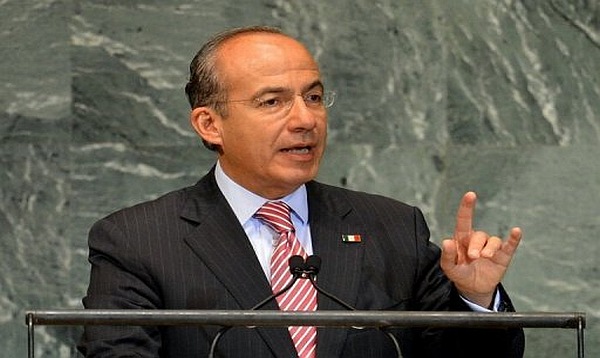Mexico City, Mexico – Mexican President Felipe Calderon signed into law on Tuesday a new statute dealing with money laundering. Designed to halt the flow of the $12 billion - $13 billion a year that, according to legislative estimates, is moved in the country illegally, the law took two years to move through Congress.
The new law "adopts the most advanced international criteria in the world of money laundering," Calderon said, vowing that these efforts would be maintained.
In a ceremony at the presidential residence, Calderon, who leaves office in December, said it was "essential to fight organized crime, particularly multinationally organized crime, in the very heart of its activities – in the flow of money that gives it the power to corrupt authorities, to intimidate citizens, and to expand its illicit activities."
The federal law for the prevention and identification of operations with funds from illicit sources will enable this to be done through several new mechanisms, including a special unit to fight money laundering that will be part of the Deputy Attorney General’s Office of Specialized Organized Crime Investigations, or Siedo, an agency of the federal Attorney General’s Office, he said.
The law also establishes a limit on cash transactions and those linked to gambling, contests, and lotteries, as well as the issuing of, or trading in of, non-bank credit cards and travelers checks.
 |
The law also bans cash transactions in certain real estate operations with a value higher than $1 million Mexican pesos - about $77,519 - or in the buying and selling of vehicles worth more than $200,000 pesos or $15,504.
In the case of jewelry, precious metals, gemstones, and works of art, cash payments are restricted to prices below $300,000 pesos or about $23,256.
Calderon said that "during his term in office, Mexico has waged an unprecedented war in favor of legality, justice, and freedoms of which these regulations are a part."
"The government has acted strongly because that is its duty. It has acted outside of all political considerations or any short-term interests," he said.
He said that when he became president in December 2006, there was a "systemic deterioration" that has been reversed as institutions have been transformed.
During his speech, Finance Secretary Jose Antonio Meade said that with the new law against money laundering, Mexico will "improve its international rating with the Financial Action Task Force."
The law, which goes into effect in about 90 days, comes a few months after a report by the United States Senate which said that in 2007 and 2008 the Mexican affiliate of the HSBC group introduced $7 billion dollars in cash into the financial system of that country without considering the source or characteristics of the transactions.
In Mexico, authorities fined HSBC $27.6 million for reporting too late almost 2,000 unusual operations and omitting another 39, presumably related to money laundering, and for administrative failures detected between 2007 and 2008.
The fact that the law took two years to move through Congress illustrates the sensitive nature of such rules in a society where small businesses and retailers, as well as gangsters, have long conducted many of their transactions in cash.


